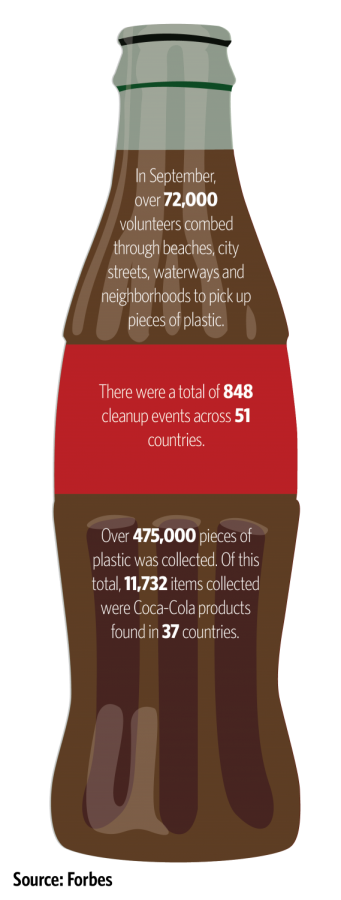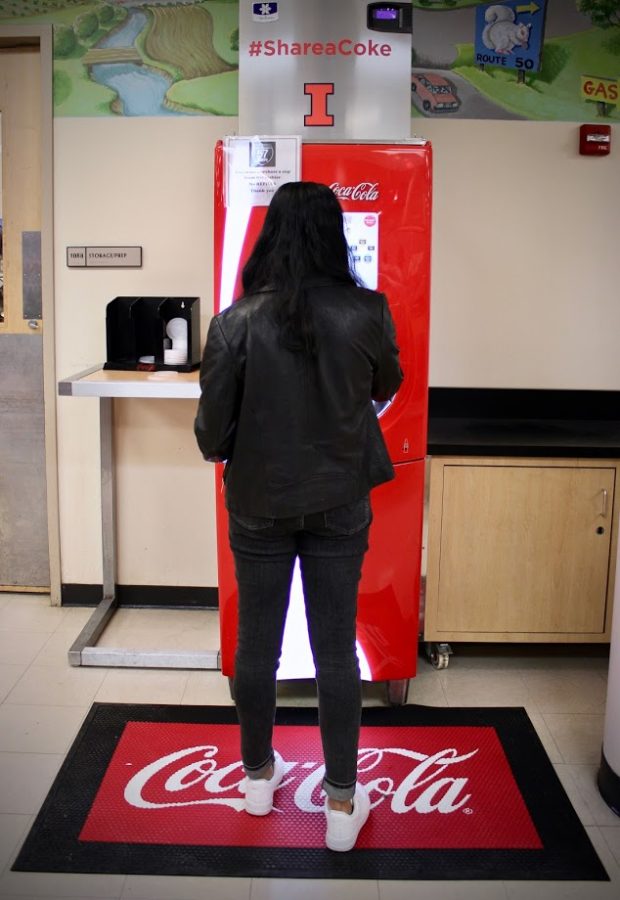University bottler Coca-Cola leads in plastic pollution
A student uses the Freestyle Coca-Cola machine in 57 North on Friday evening. The Coca-Cola Company was named the world’s leading plastic polluter for the second year in a row and and has been the University’s sole beverage provider since 2010.
November 18, 2019
The Coca-Cola Company was named the world’s leading plastic polluter for the second year in a row.
Non-governmental organization Break Free from Plastic held 848 plastic cleanup events in 51 countries around the world. Participants collected 11,732 pieces of plastic from Coke products, over 6,000 more than runner-up Nestle.
The University has a complicated contractual history with Coca-Cola. In 2007, Pepsi outbid Coca-Cola for exclusive pouring rights on Illinois state property, including its four universities.
From 2005-2007, local organization Coalition Against Coke Contracts pressured the University to terminate its business relationship with Coke, citing human rights violations in India and Colombia.
After three years of Pepsi, Coke won a 2010 rebid and has been the University’s sole beverage provider ever since. The current renewal is set to expire on June 30.
Get The Daily Illini in your inbox!
Coke’s stake in the University contract goes beyond expanding its brand.
“The visibility of Coke brands on campus not only serves a promotional purpose to sell those drinks in those locations, but it also legitimizes the company and those brands by associating Coke with all the positive functioning and feelings around the University,” said Amanda Ciafone, professor in Media.
Earlier this year, Ciafone wrote “Counter-Cola: A Multinational History of the Global Corporation,” examining the company’s global influence on politics and culture.
“Coke really wants to be seen as a good corporate citizen, to be seen as investing in these environmental responsibility initiatives,” Ciafone said.
Coke has a history of “pushing back” against environmental critiques and directly targeting regulations, Ciafone said. Since Coca-Cola externalizes bottling to other companies, it shields itself from criticism of its pollution.
Coke has recently opposed bottle bills, where customers can collect a few cents for returning plastic bottles. For the 10 states that have them, recycling is noticeably higher.
The company has raised lofty anti-pollution goals, aiming to collect and recycle the equivalent of 100% of the packaging it sells by 2030.
Contract details
The contract makes Coca-Cola the exclusive beverage provider for the University and requires the implementation of Coke advertising and signage across campus, mainly inside its athletic buildings.
In return, the University receives an annual sponsorship fee of $575,000, along with commissions for vending machine sales of certain Coke products.

For example, the University receives 40% commissions on vending sales of Dasani bottled water. Dasani bottles are the top-selling Coke product on campus according to Lori Holmes, assistant director of vending operations for the Illini Union.
“Coca-Cola has been unusually generous in donating product, time and special event opportunities for the students,” Holmes said in an email.
Coke organizes the annual Illini Union Student Barbecue and several yearly Main Quad dinners. These and the provided beverages are all free of charge.
Holmes said she is “impressed” by the Break Free from Plastic movement and is “hopeful that it gains enough momentum to truly make a difference in how corporations view their environmental responsibilities.”
“As with most reports like this, they do not recognize or reference the work that companies are doing to address the issues. Coca-Cola has been working diligently to eradicate as much waste as possible in a variety of different ways,” Holmes said.
Along with PepsiCo, Keurig and Dr. Pepper, Coca-Cola launched the “Every Bottle Back” initiative last month, pledging to improve the collection of the industry’s plastic bottles.
Coke’s University future
Bugra Sahin, senior in Engineering, serves as chair for the committee of Resilience, Sustainability and Environmental Justice in Illinois Student Government.
Sahin helped organize campus divestment movements, like Fossil Free UIUC and Beyond Coal, which made through the ISG student senate and before the Board of Trustees.
“The people’s effect in really accelerating climate change is very minuscule compared to the corporations that aren’t held accountable,” Sahin said. “Even if every person was zero waste as a person, we wouldn’t really get anywhere.”
Sahin said ISG hasn’t fielded any recent concerns about the Coca-Cola Company.
“Coca-Cola, I feel like, has been overlooked a little, plastic pollution especially,” Sahin said. “It’s definitely something we should work on.”
The 2015 Illinois Climate Action Plan said compliance with environmental standards “should be required, or at least given significant weight,” for University purchases in its Zero Waste Goals section.
“Campus could revise its purchasing systems to curtail purchases of products and services which fail to satisfy selected environmental standards and preferences,” reads the iCAP section.
Once the Coke contract expires in 2020, a Request for Proposal will be issued for companies to send in bids to be the University’s beverage provider.
Each proposal will be independently scored on pre-selected criteria by a committee of University officials and stakeholders. The company with the highest score can enter negotiations with the University.
Holmes said there is language in these RFPs, such that “preference will be given” to companies with “proven sustainability/environmental programs.”
Editor’s note: A previous version of this article stated Amanda Ciafone said “Coke really wants to be seen as a good consumer citizen.” The Daily Illini regrets this error.







